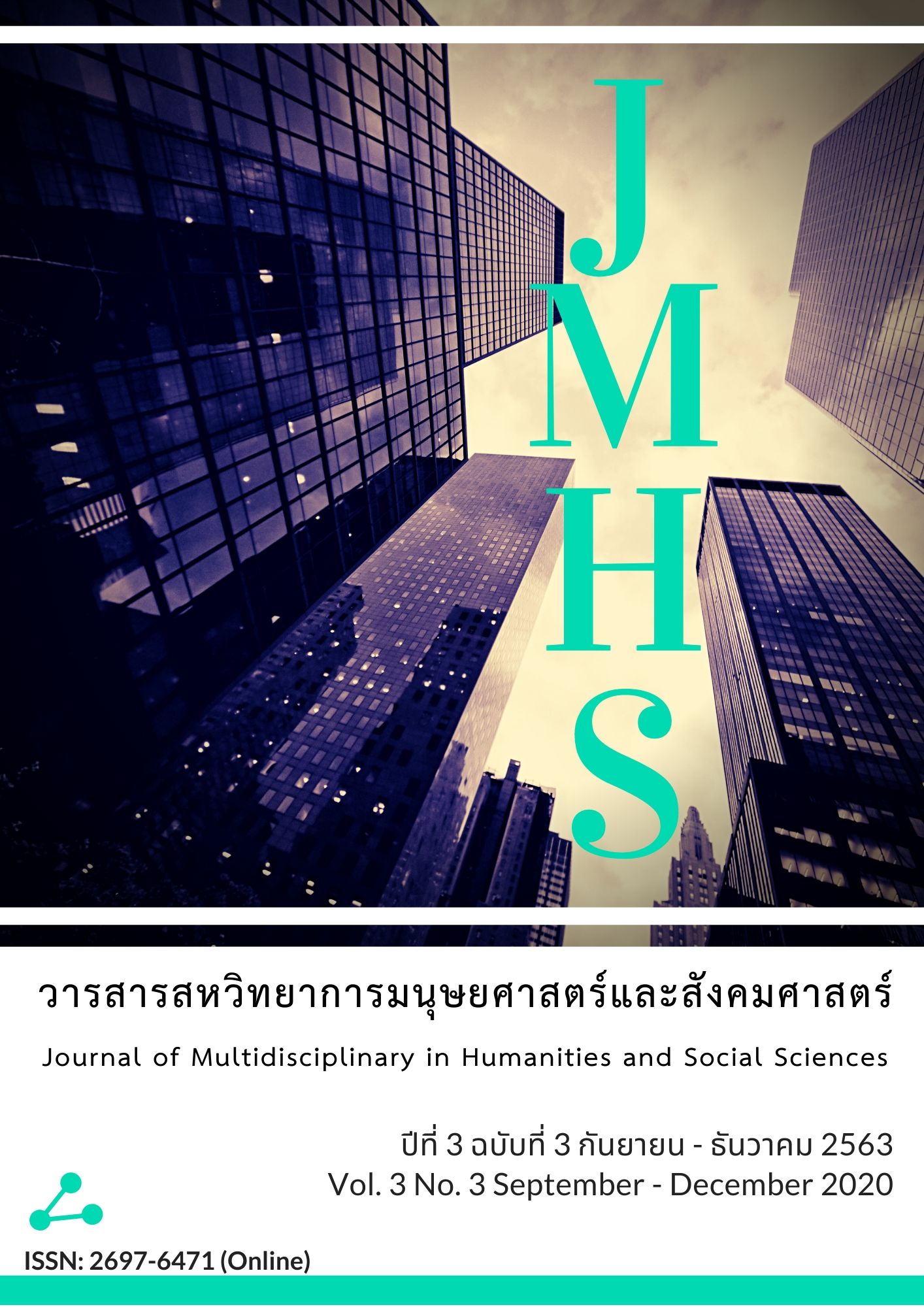Human Capital Management In Private Company That Impacts The Decision Making Of New Graduated Candidates
Main Article Content
Abstract
The objectives of this research are (1) to study human capital management in private companies and (2) to study new graduates decision to apply for a job in a private companies and (3) to find the relationship between human capital management of private companies that affect the decision to apply for new graduates. This study applies the quantitative research method, Human Capital Management Theory and Dicision Making Theory. The research area is Bangkok. The sampling group was 400 samplings of new graduates from public and private universities in Thailand and abroad by accidental sampling and using questionnaire. The data were analyzed by statistical tools such as frequency, percentage, mean, standard deviation, T-Test, One-way Anova Analysis and Pearson Correlation. The results of the research were 1) The results of the research according to the first objective of human capital management of private companies were at a high level (= 4.11, S.D. = 0.691), 2) The results of the research according to the 2nd objective was found that the graduates' decision to apply for employment in private companies The overall picture is at a high level (
= 4.17, S.D. = 0.745) and 3) The research results according to the 3rd objective was found that human capital management of private companies has a relationship with the decision to apply for a new graduate work with a correlation coefficient (R) of .830.
Findings from this research, private companies can use to analyze and plan human capital management suitable for target workers by communicating through both online and offline channels to a group of new graduates who searching for basic information of the company before deciding to apply for work.
Article Details
Views and opinions appearing in the Journal it is the responsibility of the author of the article, and does not constitute the view and responsibility of the editorial team.
References
กัลณพัฒน์ รัศมีเมฆินทร์. (2551). MD ชี้ชะตาธุรกิจ = Making Decisions Effectively. กรุงเทพ: ไอ เอ็ม บุ๊คส์.
ไกรสอน ธมฺมรํสี (คำน้อย), พระครูปลัด. (2560). รูปแบบการตัดสินใจเชิงพุทธสำหรับผู้บริหารสถานศึกษาสำนักงานเขตพื้นที่การศึกษามัธยมศึกษาในเขตกรุงเทพมหานคร. ดุษฎีนิพนธ์หลักสูตรปริญญาพุทธศาสตร์ดุษฎีบัณฑิต. มหาวิทยาลัยมหาจุฬาลงกรณราชวิทยาลัย.
ชมพูนุช กิตติดุลยการ. (2558). การศึกษากระบวนการตัดสินใจซื้อผลิตภัณฑ์เสริมอาหารของผู้บริโภคในเขตกรุงเทพมหานคร. การค้นคว้าอิสระหลักสูตรบริหารธุรกิจมหาบัณฑิต. มหาวิทยาลัยธรรมศาสตร์.
ธงชัย สันติวงษ์. (2546). การบริหารทุนมนุษย์ = Human Capital Management (พิมพ์ครั้งที่ 11). กรุงเทพฯ: บริษัท ประชุมช่าง.
ธวัชชัย มงคลสกุลฤทธิ์. (2550). จงเป็น..เจ้างั่ง..ที่ชาญฉลาด = Smart Decision. กรุงเทพฯ: ด่านสุทธาการพิมพ์.
ธานินทร์ ศิลป์จารุ. (2553). การวิจัยและวิเคราะห์ข้อมูลทางสถิติด้วย SPSS (พิมพ์ครั้งที่ 11). กรุงเทพฯ: บิสซิเนสอาร์แอนด์ดี.
นพอนันต์ เพียรมั่นคง. (2559). ปัจจัยที่ส่งผลในการเลือกอาชีพของนักศึกษาสาขาการจัดการการบิน สถาบันเทคโนโลยีการบิน มหาวิทยาลัยเทคโนโลยีราชมงคลตะวันออก วิทยาเขตบางพระ. การประชุมหาดใหญ่วิชาการระดับชาติ และนานาชาติ ครั้งที่ 7 วันที่ 23 มิถุนายน 2559 มหาวิทยาลัยหาดใหญ่.
บุญทัน ดอกไธสง. (2551). การจัดการทุนมนุษย์ Human Capital Management. กรุงเทพฯ: พิมพ์ตะวัน.
พิชิต เทพวรรณ์. (2555). A – Z เครื่องมือการจัดการทรัพยากรมนุษย์สมัยใหม่. กรุงเทพฯ: ซีเอ็ด ยูเคชั่น.
วชิรวัชร งามละม่อม. (2558). ทฤษฎีการจัดการทุนมนุษย์. สืบค้นเมื่อ 23 ธันวาคม 2562, จาก http://learningofpublic.blogspot.com/2015/09/blog-post_45.html
ศิริวัฒน์ เหมือนโพธิ์. (2560). กระบวนการตัดสินใจซื้อกล้องวงจร ปิดของผู้บริโภคในเขตกรุงเทพมหานคร. วิทยานิพนธ์หลักสูตรบริหารธุรกิจมหาบัณฑิต. มหาวิทยาลัยเทคโนโลยีราชมงคลกรุงเทพ.
อรวรรณ ไพโรจนวุฒิพงศ์. (2560). การจัดการทุนมนุษย์ในฐานะปัจจัยคั่นกลางที่ถ่ายทอดอิทธิพลของการจัดการความรู้และการจัดการผลงานสู่ผลการดำเนินงานขององค์การธุรกิจบริการในตลาดหลักทรัพย์แห่งประเทศไทย. ดุษฎีนิพนธ์หลักสูตรบริหารธุรกิจดุษฎีบัณฑิต. มหาวิทยาลัยสุโขทัยธรรมาธิราช.


